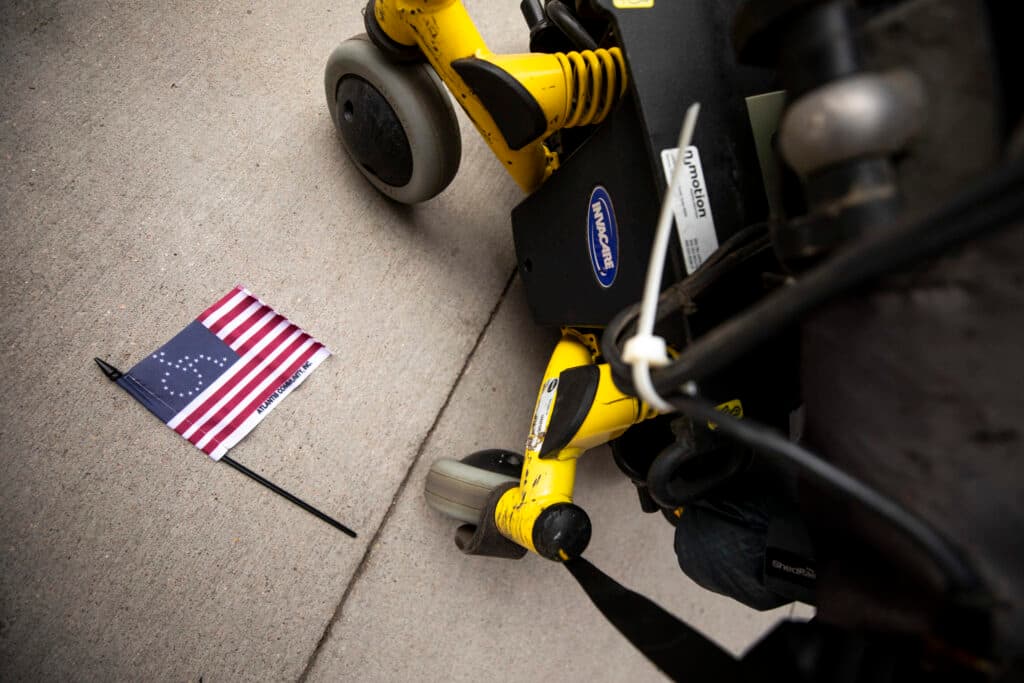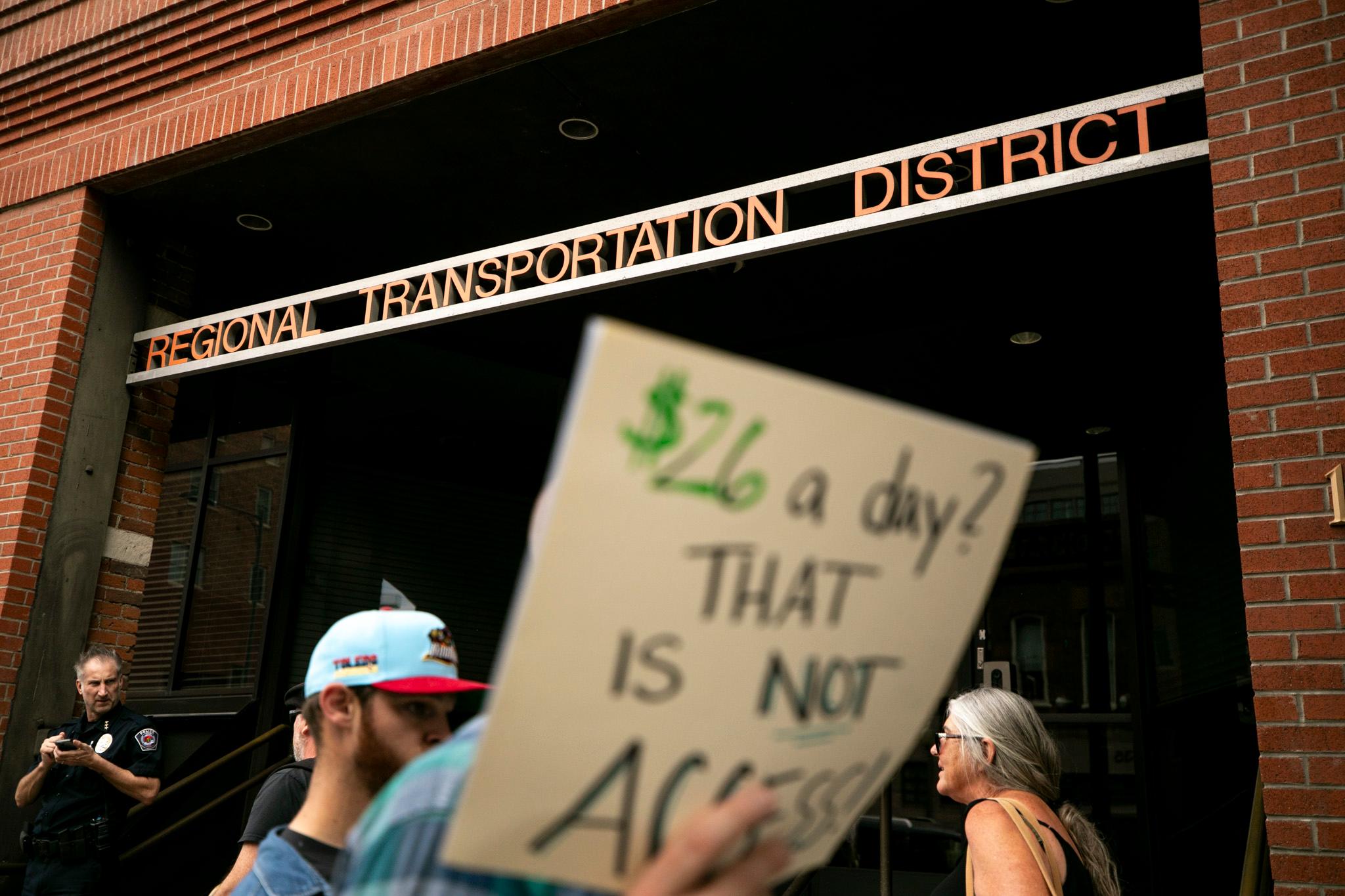The RTD Board of Directors unanimously voted on Tuesday to rename Civic Center Station after a local disability rights hero — at the same time as activists protested the agency over proposed changes to a popular paratransit program.
The busy transit hub will become the Wade Blank Civic Center Station, named after the late Rev. Wade Blank, who was an important figure in the U.S. disability rights movement.
He co-founded Atlantis Community and led a group of activists known as “The Gang of 19.” In July 1978, those 19 disability activists brought downtown Denver traffic to a standstill by using their bodies to block two city buses for roughly 24 hours. They demanded accessible transit as they chanted: “We will ride.”
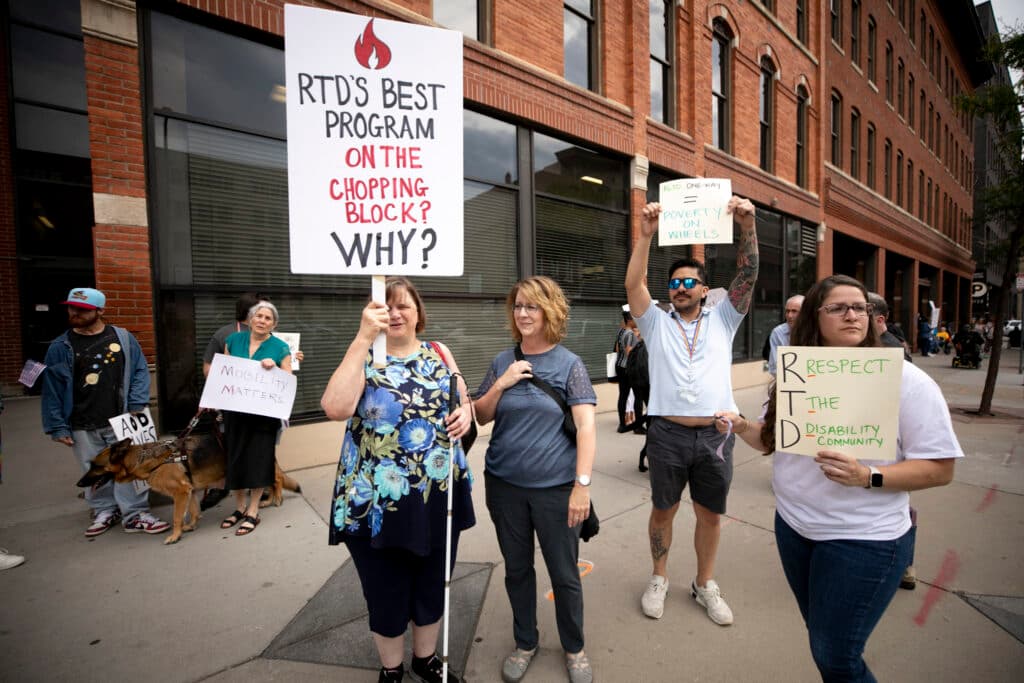
Blank was also involved with other key disability rights demonstrations, including the U.S. Capitol Crawl.
“It was excellent to hear all the different stories … and learn more about Rev. Wade Blank,” Board of Directors chair Julien Bouquet said during the meeting. “As a school teacher, it is one of the questions we always ask ourselves of the individuals that we teach [about] in history and the people who make history. And definitely Rev. Wade Blank is an individual I believe that more people should know about.”
According to a RTD news release, the total cost of the name change is estimated at $98,000 and will be covered by the RTD General Manager and CEO’s contingency fund.
Yet ahead of the board meeting, dozens gathered outside the RTD building to protest proposed changes to a popular paratransit program.
RTD is required to offer paratransit that mirrors its fixed-route bus and rail services, and Access-A-Ride is that basic safety net for people with disabilities who can’t get to a bus or rail stop.
But there are a lot of rules to use it: Access-A-Ride must be booked in advance. Pickups and drop-offs must be within a certain distance of already existing RTD bus and rail lines, and riders receive a 30-minute window in which their ride is supposed to start. Rides are also only available during standard RTD service hours.
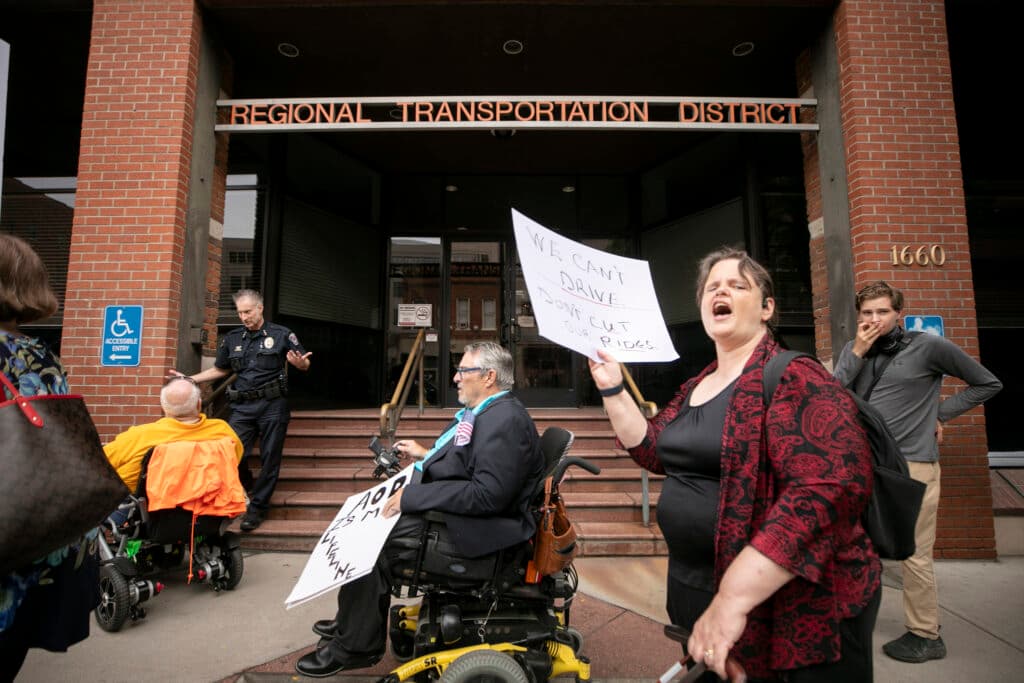
Then, several years ago, RTD piloted Access-on-Demand, or AoD. With this on-demand option, RTD subsidizes the cost of rides with participating ride-share and taxi companies, helping qualified riders get to and from where they need to go without having to book in advance. There’s currently no base fare on AoD rides.
That flexibility has proven vital to many transit users with disabilities.
Tina Ferguson took Access-on-Demand to get to the protest and said, due to chronic migraines and seizures, riding a fixed-route service line isn’t an option for her.
“[AoD] has completely changed my life to be honest. I'm not just stuck at home,” Ferguson said. “And it really makes a difference to be able to connect with the people you love.”
“First off, on demand says it all,” said Erin Daley, an AoD user who showed up for the protest. “There was one point where I had a medical scare, I went right to the hospital and sometimes I wouldn't do that in the past because for Access-a-Ride you have to do it 24 hours in advance.”
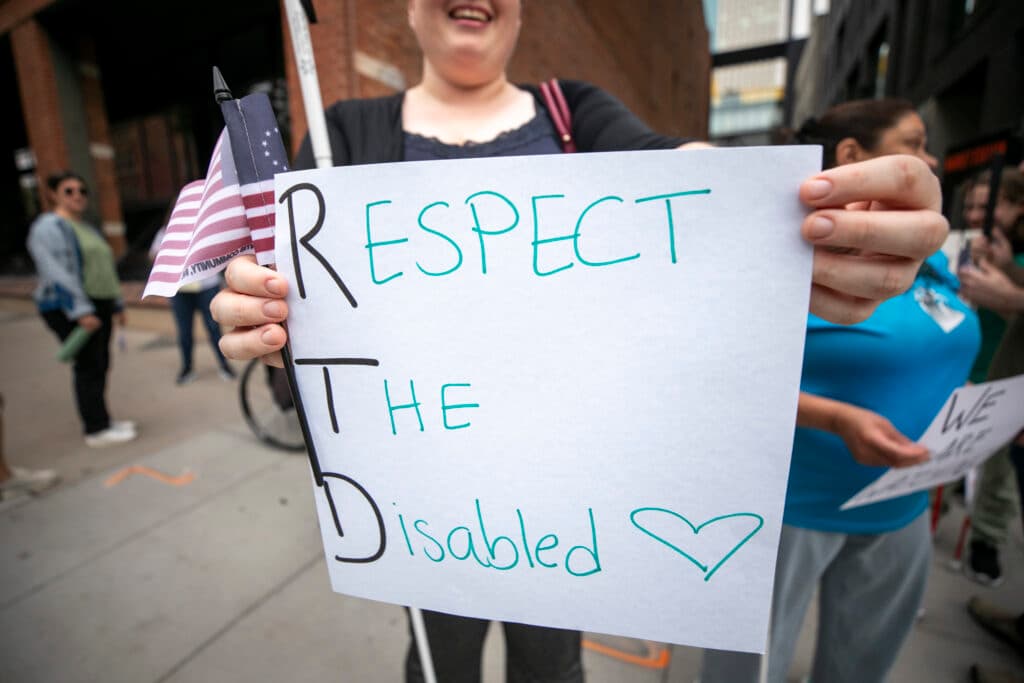
Since last year, RTD has considered proposals to bring down costs after the program’s popularity pushed up spending and prompted officials to worry about the long-term budget implications.
One of the proposed modifications put forward by RTD staff included implementing an upfront, per-ride base fare for users of $6.50 — and $3.35 for those who qualify for RTD’s income-based discount program, LiVE.
The proposal also recommended lowering the amount that RTD chips in for each ride, plus adjusting the service area and hours to match that of Access-A-Ride.
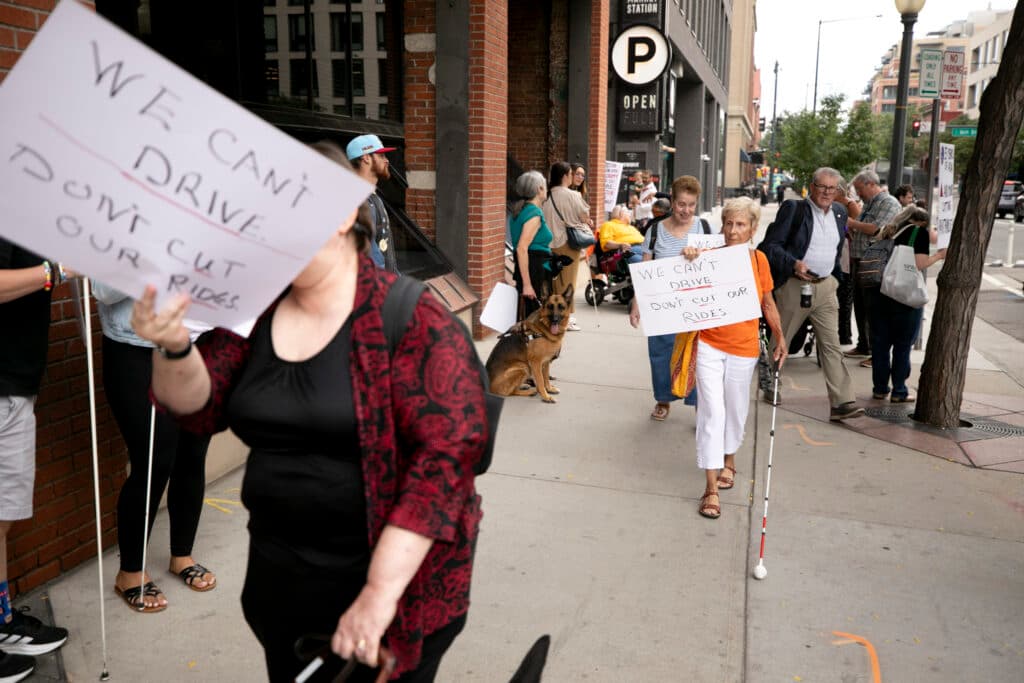
Advocates warned that that kind of fare bump would price many out of the program.
“Instead of looking for ways to cut back, we should be looking for ways to expand this,” Daley added. “Wheelchair users aren't able to completely access the system. Instead of saying, well, because of that, we need to scale back. We need to say this should work for everyone … We shouldn't cut back because it's working too well. We should move forward because it is working.”
Some called the two action items — the Civic Center Station renaming and the AoD proposal — being on the same agenda “ironic.”
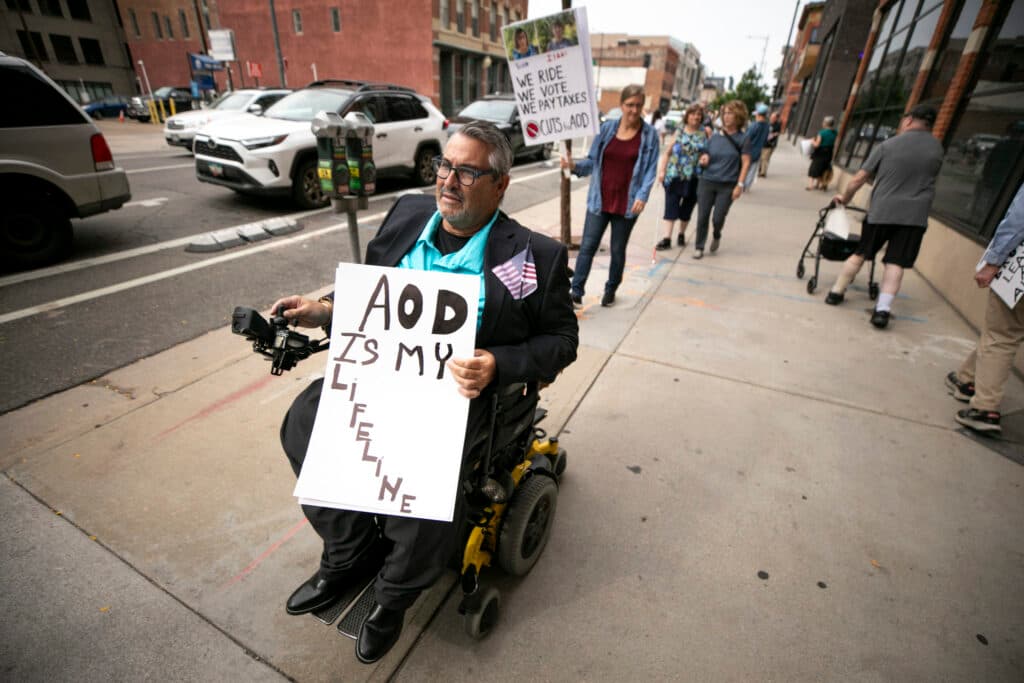
Jamie Lewis, transit advisor for Colorado Cross-Disability Coalition, said part of the rub is that RTD doesn’t appear to be “really looking at paratransit comprehensively.”
“They're looking at it as two different systems,” Lewis told CPR ahead of the Tuesday meeting. “They're looking at Access-A-Ride versus Access-on-Demand instead of saying this is a paratransit system and we need to make it work.”
Access-on-Demand users and advocates also gave hours of impassioned public comment. And RTD’s Board of Directors changed the proposals.
At times, AoD users pleaded with directors and officials not to hike up the base fare to $6.50 or make other significant changes that would make AoD harder to access.
At the meeting, directors discussed amendments, and amendments to amendments. They eventually landed on actually reducing the base fare to $2.50, and to $1.25 for LiVE riders.
They also passed an amendment that the AoD service area would include “all areas that lie within the Regional Transportation District,” and asked to include language that clarifies there would be no waiting period for qualified riders to begin using AoD. Directors also decided to explore what adding multi-stop trips could look like.
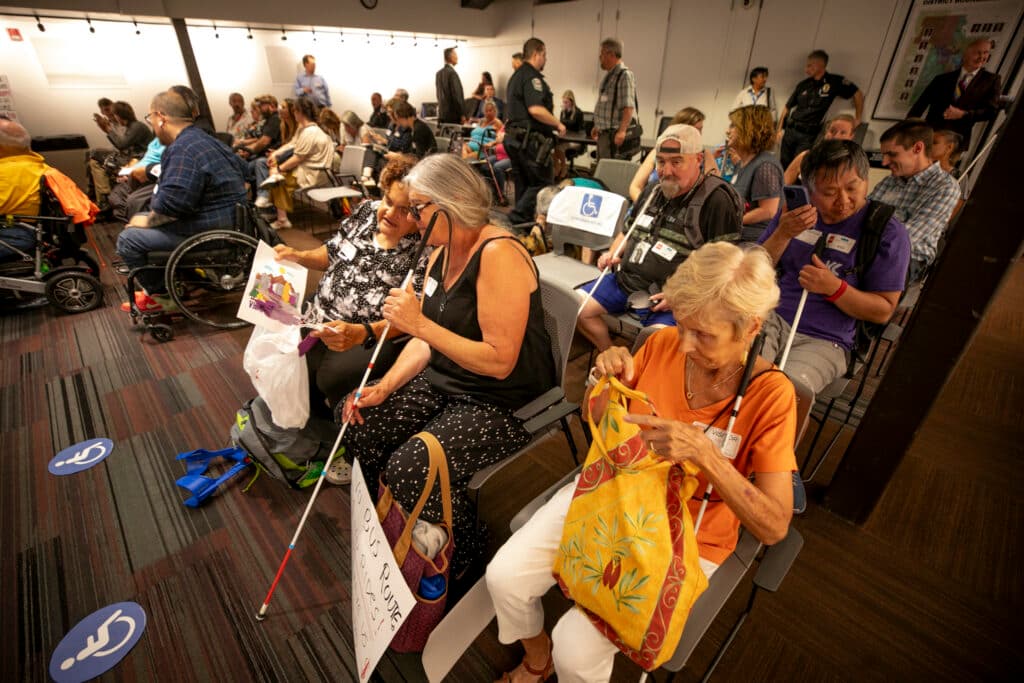
Because of the significant changes, the Board of Directors voted to send the entire action item back to the Operations, Safety and Security Committee for a new analysis and fiscal note.
Director JoyAnn Ruscha requested the committee take another look at the proposal to reduce the trip subsidy from $25 to $20, “which is also a fare increase,” she noted.
Following the meeting, ADAPT organizer Dawn Russell provided a statement to CPR News saying that the disability rights organization is “sick and tired of RTD threatening to cut back services to our community.”
“We are firmly opposed to these regressive proposals,” the statement said. “People with disabilities pay the same taxes to fund RTD as everyone else. Paratransit, Bus and Light Rail are equally important parts of our multimodal transit system. RTD’s plan to charge more money for less Paratransit services is an insult to the memory of Rev. Wade Blank and the Gang of 19. Disability rights are civil rights.”
The issue is expected to be back in front of the Board of Directors for discussion and final decision in September.
“I think Wade Blank would've been very, very proud,” Lewis, with the Colorado Cross-Disability Coalition, said of the evening’s demonstration during his public comment.
